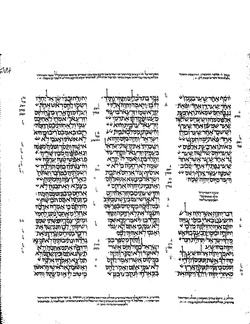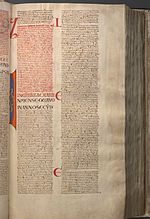Haggai 1
| Haggai 1 | |
|---|---|
 | |
| Book | Book of Haggai |
| Category | Nevi'im |
| Christian Bible part | Old Testament |
| Order in the Christian part | 37 |
Haggai 1 is the first chapter of the Book of Haggai in the Hebrew Bible or the Old Testament of the Christian Bible.[1][2] This book contains the prophecies attributed to the prophet Haggai, and is a part of the Book of the Twelve Minor Prophets.[3][4]
Text
The original text was written in Hebrew language. This chapter is divided into 15 verses.
Textual witnesses
Some early manuscripts containing the text of this chapter in Hebrew are of the Masoretic Text, which includes the Codex Cairensis (895), the Petersburg Codex of the Prophets (916), and Codex Leningradensis (1008).[5][a] Fragments cumulatively containing all verses of this chapter in Hebrew were found among the Dead Sea Scrolls, including 4Q77 (4QXIIb; 150–125 BCE) with extant verses 1–2;[7][8][9] and Wadi Murabba'at Minor Prophets (Mur88; MurXIIProph; 75-100 CE) with extant verses 1–15 (complete).[8][10]
There is also a translation into Koine Greek known as the Septuagint, made in the last few centuries BCE. Extant ancient manuscripts of the Septuagint version include Codex Vaticanus (B; B; 4th century), Codex Sinaiticus (S; BHK: S; 4th century), Codex Alexandrinus (A; A; 5th century) and Codex Marchalianus (Q; Q; 6th century).[11]
Verse 1
- In the second year of King Darius, in the sixth month, on the first day of the month, the word of the Lord came by Haggai the prophet to Zerubbabel the son of Shealtiel, governor of Judah, and to Joshua the son of Jehozadak, the high priest, saying,[12]
Cross reference: Ezra 2:2; Ezra 4:24; Ezra 5:1-3; Ezra 6:1; Zechariah 4:6; 1 Chronicles 6:15
- The date is August 29, 520 BC in current calendar calculation. The prophecies of Haggai are among the most precisely dated in the Old Testament.[13]
- "Zerubbabel, the son of Shealtiel, was the governor of Jerusalem at that time and the governor of the first group of returning exiles from Babylon (see Ezra 3:2; Nehemiah 7:7).[13]
Verse 15
- On the twenty-fourth day of the sixth month, in the second year of King Darius.[14]
Based on verse 1, this date would be September 21, 520 BC in current calendar calculation.[13]
See also
- Darius I
- Joshua, son of Jehozadak
- Month in ancient Hebrew calendar: the sixth
- Zerubbabel, son of Shealtiel
- Related Bible parts: 1 Chronicles 6, Ezra 2, Ezra 3, Ezra 4, Ezra 5, Ezra 6, Nehemiah 7, Zechariah 4
Notes
- ^ Since the anti-Jewish riots in Aleppo in 1947, the whole book has been missing from the Aleppo Codex.[6]
References
- ^ Collins 2014.
- ^ Hayes 2015.
- ^ Metzger, Bruce M., et al. The Oxford Companion to the Bible. New York: Oxford University Press, 1993.
- ^ Keck, Leander E. 1996. The New Interpreter's Bible: Volume: VII. Nashville: Abingdon.
- ^ Würthwein 1995, pp. 35–37.
- ^ P. W. Skehan (2003), "BIBLE (TEXTS)", New Catholic Encyclopedia, vol. 2 (2nd ed.), Gale, pp. 355–362
- ^ Ulrich 2010, p. 618.
- ^ a b Dead sea scrolls - Haggai
- ^ Fitzmyer 2008, p. 38.
- ^ Fitzmyer 2008, pp. 140–141.
- ^ Würthwein 1995, pp. 73–74.
- ^ Haggai 1:1 NKJV
- ^ a b c The Nelson Study Bible. Thomas Nelson, Inc. 1997. ISBN 9780840715999. pp. 1514-5.
- ^ Haggai 1:15 KJV
Sources
- Collins, John J. (2014). Introduction to the Hebrew Scriptures. Fortress Press. ISBN 9781451469233.
- Fitzmyer, Joseph A. (2008). A Guide to the Dead Sea Scrolls and Related Literature. Grand Rapids, MI: William B. Eerdmans Publishing Company. ISBN 9780802862419.
- Hayes, Christine (2015). Introduction to the Bible. Yale University Press. ISBN 978-0300188271.
- Petersen, D. L. (2007). "36. Haggai". In Barton, John; Muddiman, John (eds.). The Oxford Bible Commentary (first (paperback) ed.). Oxford University Press. pp. 607–610. ISBN 978-0199277186. Retrieved February 6, 2019.
- Ulrich, Eugene, ed. (2010). The Biblical Qumran Scrolls: Transcriptions and Textual Variants. Brill.
- Würthwein, Ernst (1995). The Text of the Old Testament. Translated by Rhodes, Erroll F. Grand Rapids, MI: Wm. B. Eerdmans. ISBN 0-8028-0788-7. Retrieved January 26, 2019.
External links
- Jewish translations:
- Chaggai – Haggai (Judaica Press) translation with Rashi's commentary at Chabad.org
- Christian translations:
- Online Bible at GospelHall.org (ESV, KJV, Darby, American Standard Version, Bible in Basic English)
 Haggai public domain audiobook at LibriVox Various versions
Haggai public domain audiobook at LibriVox Various versions



